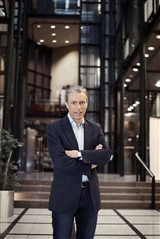Rolv Erik Ryssdal, CEO of Schibsted Media Group from 2009 to 2018, has become became CEO of new Schibsted venture, Marketplace International (MPI) since giving this interview.
In 1991, he graduated from INSEAD with an MBA. He is passionate about innovation and entrepreneurship, and believes an entrepreneurial focus can prepare a person for many roles. He knows the importance of working hard, and having a clear strategy.

Where and when did you earn your MBA?
I hold an MBA from INSEAD in France. I completed their programme in 1991.
Tell us about your current role
I lead Schibsted Media Group, an international media group with 7300 employees. We are active in 22 countries. I have been the Group’s CEO since 2009. We run digital marketplaces, and are number one in online classifieds in 18 markets. From Mexico to Spain, from Brazil to Norway, more than 200 million people interact with Schibsted companies every day. Schibsted Media Group was built on entrepreneurship and innovation, and we continue to invest in great entrepreneurs and help them scale their businesses locally and internationally, by leveraging the Schibsted ecosystem.
What is the most interesting thing you learnt from your MBA?
Strategy, organisational behaviour and leadership are very important, but entrepreneurial focus is gold as it prepares you for many roles including being an employer, an investor, and an inventor. I am proud that entrepreneurship has also been at the heart of Schibsted. Christian Schibsted, who started the company in 1839, was an entrepreneur with an interest in new technology. Today we are as reliant as ever on good entrepreneurship. I am very happy when I see people in our companies – both in the big established companies and in the start-ups – who execute on innovation and keep that entrepreneurial spirit alive.
How has the MBA made a difference in your life? In particular, your career path and leadership journey?
In its early days Schibsted was a family business that basically owned two newspapers. Very gradually, the company started to expand. Our biggest break came when we invested heavily in Europe around 2005-2006. At the time, we were criticised for expanding too aggressively and spending too much money. However, I felt confident because I knew that this would change the mind-set of people working at Schibsted. Sure enough, from that moment on, we started perceiving ourselves not only as a Scandinavian company, but as a European leader.
It’s hard to lead a company in this fast-changing world. It’s not possible to say what media business will look like in even five years from now. But there are a few things we do know, and these things guide me in my work. For example, we know what kind of competencies will be important in the future. Therefore, I encourage my strategic and people teams to focus on what we believe we need to be strong at. In our case this is technology and product management. We also know that Schibsted will be much stronger as one team rather than have all its subsidiaries go at it alone. And this is another area we focus on.
My MBA has taught me that good results don’t happen by magic, although a little luck never hurts. Good results come from a clear strategy executed by great people.



